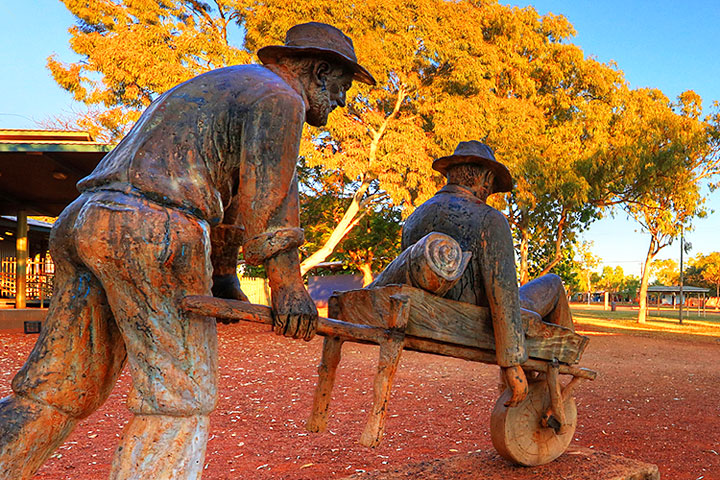Russian Jack - A Pioneering Hero
 IVAN FREDERICKS
IVAN FREDERICKS
Born: Archangelosk Russia 1864
Died: Fremantle Western Australia 1904
Ivan Fredericks (1864–1904), better known as Russian Jack, was a goldminer of the Western Australian gold rush in the 1880s.
In 1885, while working in the Halls Creek goldmines, he pushed his sick friend in a wheelbarrow 300 km through the Great Sandy Desert to Wyndham, the nearest town with a medical centre.
In 1928 the eccentric journalist, Mrs. Daisy Bates recalled Russian Jack in a newspaper report, stating that he came from " some Russian seaport in the late 1880's. He was a tall, hefty man, with a voice like a Bull of Bashan, and he knew only a dozen words of English when he first arrived in WA.
Following the lure of gold, he found his way northward to the Kimberley district with an Australian mate. No one knew Russian Jack by any other name. He and his mate worked around the Derby area, paying their way and keeping their and up. And whatever distance they might be from Derby or Broome township Jack trolled his wheelbarrow in for supplies, leaving his less hefty mate at the gold workings. One day, when Jack had returned with a barrow load of fresh supplies, he found his mate down with fever. Tender as he was huge, Jack nursed his mate with the devotion of a true friend. When, with no avail, he had tried on him all the patent medicines at the camp, he said in his big voice: I'll take you to Broome to see a doctor. His mate protested, but Jack did not argue. He made his wheelbarrow into a sort of ambulance, fixed a place to hold some rations and a gun, put his made to rest on the improvised bed, and started to wheel him nearly 150 miles (240 kms).
Over rough and smooth country, by dry creek beds and river crossing haunted by alligators (she meant crocodiles), Jack trundled his sick mate, resting when his patient was fatigued, cheerily nursing and feeding him and brought him triumphantly to Broome and saved his life.
In 1970's, Mrs Bates noted while travelling to the Murchison area, that she actually met the big Russian. She wrote about 25 miles (40kms) from the Peak Hill Goldfields we had stopped our buggy to wait and rest when out from the bush camp stepped a big burly man with a huge melon in his hands, and from his mouth boomed the words: Melon very good lady. You like rest and eat? In a moment I thought of Russian Jack and sure enough, it was he. But no answer would he give to my question about his work for the love of his mate, all I could persuade him to say was: That was a long time ago. That was nothing. His mate had married and settled down and Jack was cultivating vegetable garden for the Peak Hills Goldfields and was in charge of the coach horses plying between the gold area and the coast. Still he kept his good name with everybody and helped many a down-and-outer.
In honesty, in singleminded of purpose, in the clean simplicity of his life and religion, this Russian Jack was a great man in his ideal of the real friendship that means so much when men are thrown together far back in a continental interior like Australia. It was this magnificent effort that prompted the residents of Halls Creek to erect a posthumous statue to commemorate the super-human effort of the gracious Russian immigrant.
Another recorded incident concerns Russian Jack and a mate returning from an unsuccessful prospecting venture inland when their food supply ran dangerously low and they decided to shoot a Kangaroo to help feed them along the track. Jack's mate spotted a kangaroo and decided to chase it on foot. Unfortunately, he tripped and broke a leg. In typical fashion, Jack lifted his injured mate onto his wheelbarrow and pushed him to safety. When the pair eventually arrived in town, one of the locals mentioned that Jack must have travelled over a certain rough track, one noted for its potholes, stones and gullies. Jack told the admiring on-lookers I pushed him over 100 miles (160kms) in that damn wheelbarrow. The man with the broken leg, from Russian Jacks wheelbarrow remarked dryly: Yes and I'll answer so far he hasn’t missed a rock.
While working at a Mount Morgan gold mine, Jack fell down and jagged open cut excavation while strolling through the bush in the darkness. Three days later other prospectors found him he was 21.4m below the ground surface cut and fly blown and his only comment was to his rescuers: I've missed a shift.
At the gold town of Coolgardie is believed to be preserved the wheelbarrow, which in the late 1800'd Russian Jack pushed from Southern Cross to Coolgardie, traversing over 185kms of trackless, arid desert country in search for gold. The wheelbarrow had shafts 2.1m in length and the timber utilised was casing that had been used to transport galvanised iron. The large wooden wheel may have been useful in crossing the sandy patches, but its friction on the axle must have been quite severe, requiring extraordinary strength to negotiate over the hazardous landscape.
A prospector observed: Most men, many of whom pushed wheelbarrows themselves, could not move this one. It had a wheel in the middle instead of in the front and its shafts were seven feet long. The barrow is said to have been loaded high with heavy tools, blankets, a water cask and supplies for several months.
Russian Jack came into town for provisions on one occasion during a prospecting stint. As was his habit, he also stopped at the hotel for one beer too many.
When he arrived for Jack to return to his prospecting site about 12km out of town, he hastily threw on to his great wheelbarrow all his groceries, a bag potatoes, drilling gear and explosives. His dynamite was secured in a wooden box, but a tin of 50 firing caps-extremely sensitive objects-were casually thrown on top of the unwieldy load.
Jack tied nothing down. Everything on the wheelbarrow was carelessly arranged. With the slightest mishap, the firing caps could easily explode, causing severe damage or worse nonplussed, Jack did not care, he was happily drunk. Some observers on the main street watched as Russian Jack effortlessly took up the shafts of his great wheelbarrow and uncertainly tried to push it in the right direction. But being inebriated, he progressed haltingly, weaving all over the road.
A policeman observing Jack's erratic steps, remark to a companion: Russian Jack has a load up inside as well as on his barrow, and decided to intervene by escorting him safety out of town. Along the way however, the policeman spotted the tin of firing caps balanced precariously on top of the load. Jack informed the constable ha had recently received some money for gold nuggets sent to the bank, and was intent on proceeding to his mine, the firelight, about 12km away. For his own safety, the lawman decided to arrest Russian Jack, but was uncertain how to do this, as the big Russian was an unusually strong man and had to be handled cautiously at the best of times.
Jack continued staggering all over the road, bellowing out a song in his raucous, booming voice. As he drew near the police tents, several policeman intercepted Jack, suggesting quietly that he should repack his barrow. Ever so diplomatically, the police offered the big man a cup of tea as together, they planned their course of action in getting the Russian safely out of town and back to his bush camp. By this time Jack was thirsty again and he agreed to sit down quietly for a spell. As Jack rested he started to doze off. The police repacked his barrow securely while waiting for the billie to boil.
Soon Russian Jack was fast asleep, so the policeman handcuffed the big man to the huge log, their intention being to restrain him until he had sobered and was capable of undertaking a safe journey back to his camp in the bush. Overnight, the policeman was summoned urgently out of town to Cuddingwarra, about 16 km to the west. In his concentration, the policeman completely forgot about Russian Jack being left chained to the huge log near the police tents.
Later in the day the policeman suddenly remembered the big drunken Russian he had left behind at Cue, chained to a log. Ridding back quickly, the policeman was stunned to find that Russian Jack was gone. So was the log. The great stump had been bodily uprooted and there were dragging marks on the ground for several metres.
It would have taken four men to lift the jail log he reasoned, so perhaps some of the residents had moved the log Jack to a shady place out of the sun. When the policeman conducted a quick search of the town site, at the hotel he discovered Russian Jack sitting quietly at the bar having a conversation with the barman. The log was propped up on the counter and Jack was still chained to it.
It was learnt that Jack had awakened, it was daylight, and the merciless sun was beating down on him with a vengeance. Famished for a drink, and not particularly fussy how he obtained it, the big Russian wrenched the tree stump from the ground, balanced it on a shoulder, and walked away in search of refreshment at the nearest pub which was a quarter of a mile away. When the hotel opened its doors, there was Russian Jack, chained to a log, asking for a cool ale to prevent him dying of thirst.
I thought I left you in jail, Jack, the policeman said. So you did, Jack replied, but it was low-down you leave me all night with no drink. Anyway, you have one drink with me now and i'll go back to jail. With an amazed police offer in tow, Russian Jack again shouldered the jail log and strolled back to the police tents where he resorted the makeshift jail to its original location.
At the police camp the officer removed Jack's chain and put a billy on the campfire, which they shared. The policeman said to him, "You had better go back to your show (goldmine), and the next time you want to have a few pots, don't buy explosives at the same time."
Later Jack gratefully thanked the policeman for preventing him leaving town with his firing caps unsecured. Jack's physical strength was known to be immense and many were the stories told of his magnificent feats.
At one time, when working as a labourer on Doorawarrah Station, he was dismissed by his employer for wrecking equipment. Jack allegedly bent a 4cm octagonal crowbar over his knees in an angry moment.
On another goldfield, at Peak Hill, Russian Jack ran a crude-eating house. With a manure heap nearby, millions of flies were usually added to a meal of damper (crude bush bread) and tea.
A frenchman, Albert Duclos, set up his camp close to Russian Jack's business, hoping to steal some of his customers. As the two were already enemies, Jack took quick action: he chased the Frenchman with a meat chopper, threatening to make him the mincemeat. Duclos escaped from the enraged Russian, but thereafter kept a respectable distance between them.
In his grubby eating house the big man waited on his customers - all of them rough gold diggers - without ever wearing boots and his unwashed trousers rolled up to his knees.
He is said to have a hand the size of a leg ham, and he sported an unruly black beard. A passing coach driver once paused outside Jack's premises to offer him a drink from a half full bottle of whiskey. No thanks, said Jack, i'm not drinking now. When the offer was repeated, Jack grudgingly consented to half a sip. He poured half the bottle of whiskey into a mug (metal cup) and swallowed the lot in one swift gulp. When the coach driver saw his empty whiskey bottle, he said, well, if he's not drinking, i'd hate to see him when he was. In time Jack was asked what he would most like to achieve in his life. He saidhe would like to retire near a city in Western Australia, grow lots of vegetables, then sit down by himself and eat the lot.
According to the official burial report, Russian Jack died in a private hospital, Mandurah Road, at Fremantle, Western Australia, on April 17, 1904, aged 40 years, after succumbing to severe pneumonia, following two week's illness, and was buried two days later in a local cemetery in the public section, Grave No. 245.
His burial particulars state his parents' names were unknown, with a Roman Catholic minister, John Smythe, officiating at the burial in the Roman Catholic Cemetery, Fremantle and also recorded as unknown is whether John Fredericks was married or had offspring. No headstone marks the site.
Why did Russian Jack a man of exceptional physical strength, die so young? Over the distance of time, the observer can only speculate. Most of his 18 years in Australia were spent in tropical or sub-tropical areas, thirsty country where men drank excessively, and Jack was certainly known to have acquired the common addiction.
Thirsty diggers often drank till they dropped, usually sleeping off the effects of bush grog under the warm southern skies. Did the big Russian make a fatal error of transferring his casual NorthWest lifestyle to the sometimes-chilly skies of Fremantle?
Did he contract pneumonia to an extent that even his hardy constitution could not adjust? We may never know. Soon after his death, a Fremantle newspaper carried a report of his passing, an old identity, John Fredericks - but a hundred times better known as Russian Jack - died a few days ago....
His death came as a surprise for on one could imagine death in the prime of life to one of such Herculean strength. He was, so far as physical manhood is concerned, a picture, but he combined the strength of lion with the tenderness of a woman. Though he had a loud sounding sonorous voice that seemed to come out of his boots, there was no more harm in it than the chirp of a bird. Many instances are known of his uniform good nature, but his extraordinary kindness, some years ago to a complete stranger...that he picked up on the track to the Kimberley gold rush exemplified his mateship.
The stranger had a wheelbarrow and some food and the burly Russian picked the stranger up, placed him on his own large wheelbarrow, together with his meagre possessions and wheeled him nearly 300 miles (480km) to a haven of refuge.
Following his death there was, and still his aura of mystery surrounding his background. This may have been due to Jack's poor knowledge of the English language, coupled with a semi-literacy and lifestyle that compelled him to live a fairy isolated existence.
Jack was buried in a public grave, that is a pauper's grave, in section CC, Grave Number 245 at Fremantle, with not even a common headstone to mark the site of one or Western Australia's most colourful pioneers.
His death certificate records his profession as 'market gardener' revealing that the big man seemingly fulfilled his life-long ambition to have his own private supply.
Following his death in 1904, a Fremantle newspaper obituary said: Russian Jack, if there are Angels in Heaven who record the good done on Earth, thou would'st have sufficient to thy credit... to wipe out the many faults that common flesh is heir to.
A statue was erected to him in Halls Creek. The statue cost the Halls Creek Shire $20,572.00 and is located at the Visitors Centre. The plague to Russian Jack was unveiled by the Hon. K.A. Ridge - Minister for housing and M.L.A. for Kimberley on 11th August 1979.









